- Home
- Simon Winchester
The Professor and the Madman: A Tale of Murder, Insanity Page 2
The Professor and the Madman: A Tale of Murder, Insanity Read online
Page 2
His wife recalled him striking a light before leaving home: Her last sight of him was under one of the bright gas-lamps with which Lambeth’s streets had recently been equipped. His breath was visible in the cold night air—or maybe he was just puffing on his pipe—and he walked purposefully down to the end of Cornwall Road before turning into Belvedere Road. The night was clear and starlit and, once his footsteps had faded, soundless except for the clanking and puffing of the ever-present railway engines.
Mrs. Merrett had no reason to be concerned: She assumed, as she had for each of the twenty previous nights on which her husband had worked the dawn shift, that all would be well. George was simply making his way as usual toward the high walls and ornate gates of the great brewery where he worked, shoveling coal beneath the shadow of the great red lion that was one of London’s better-known landmarks. There may have been little money in the job; but working at so famous an institution as the Red Lion Brewery, well, that was some reason for pride.
But that night George Merrett never reached his destination. As he passed the entrance to Tennison Street, between where the south side of the Lambeth Lead Works abutted onto the north wall of the brewery, there came a sudden cry. A man shouted at him, appeared to be chasing him, was yelling furiously. Merrett was frightened: This was something more than a mere footpad—that silent and menacing figure who lurked in the dark carrying a lead-tipped cosh and wearing a mask; this was something quite out of the ordinary, and Merrett began to run in terror, slipping and sliding on the frost-slick cobbles. He looked back: The man was still there, still chasing after him, still shouting angrily. Then, quite incredibly, he stopped and raised a gun, took aim, and fired.
The shot missed, whistling past him and striking the brewery wall. George Merrett tried to run faster. He cried out for help. There was another shot. Perhaps another. And then a final shot that struck the unfortunate Merrett in the neck. He fell heavily onto the cobbled pavement, his face down, a pool of blood spreading around him.
Moments later came the running footfalls of Constable Burton, who found the man, lifted him, and attempted to comfort him. The other policeman, William Ward, summoned a passing hansom cab from the still-busy thoroughfare of Waterloo Road. They gently picked the wounded man up from the ground, hoisted him into the vehicle, and ordered the driver to take them as fast as possible to St. Thomas’s Hospital, five hundred yards farther south on Belvedere Road, across from the archbishop’s London palace. The horses did their best, their hooves striking sparks from the cobbles as they rushed the victim to the emergency entrance.
It was a futile journey. Doctors examined George Merrett and attempted to close the gaping wound in his neck. But his carotid artery had been severed, his spine snapped by two large-caliber bullets.
The man who had perpetrated this unprecedented crime was, within moments of committing it, in the firm custody of Constable Tarrant. He was a tall, well-dressed man of what the policeman described as “military appearance,” with an erect bearing and a haughty air. He held a still-smoking revolver in his right hand. He made no attempt to run but stood silently as the policeman approached.
“Who is it that has fired?” asked the constable.
“I did,” said the man, holding up the gun. Tarrant snatched it from him.
“Whom did you fire at?” he asked.
The man pointed down Belvedere Road, to the figure lying motionless beneath a street lamp just outside the brewery store. He made the only droll remark that history records him as having made—but a remark that, as it happens, betrayed one of the driving weaknesses of his life.
“It was a man,” he said, with a tone of disdain. “You do not suppose I would be so cowardly as to shoot a woman!”
By now two other policemen had arrived on the scene, as had inquisitive locals—among them the Hungerford Bridge toll collector, who at first had not dared go out “for fear I would take a bullet,” and a woman undressing in her room on Tennison Street—a street in which it was apparently far from uncommon for women to be undressing at all hours. Constable Tarrant, pointing toward the victim and ordering his two colleagues to see what they could do for him and to prevent a crowd from gathering, escorted the supposed—and unprotesting—murderer to the Tower Street police station.
On the way his prisoner became rather more voluble, though Tarrant described him as cool, collected, and clearly not affected by drink. It had all been a terrible accident; he had shot the wrong man, he insisted. He was after someone else, someone quite different. Someone had broken into his room; he was simply chasing him away, defending himself as anyone surely had a perfect right to do.
“Don’t handle me!” he said, when Tarrant put a hand on his shoulder. But then, rather more gently, he said to the policeman: “You have not searched me, you know.”
“I’ll do that at the station,” replied the constable.
“How do you know I haven’t got another gun, and might shoot you?”
The policeman, plodding and imperturbable, replied that if he did have another gun, perhaps he would be so kind as to keep it in his pocket for the time being.
“But I do have a knife,” replied the prisoner.
“Keep that in your pocket also,” said the stolid constable.
There turned out to be no other gun, but a search did turn up a long hunting knife in a leather sheath, strapped to the man’s belt behind his back.
“A surgical instrument,” it was explained. “I don’t always carry it with me.”
Tarrant, once he had completed the search, explained to the desk sergeant what had happened on Belvedere Road a few moments before. The pair then set about formally interviewing the arrested man.
His name was William Chester Minor. He was thirty-seven years old, and, as the policemen suspected from his bearing, a former army officer. He was also a qualified surgeon. He had lived in London for less than a year and had taken rooms locally, living alone in a simple furnished upstairs room nearby at 41 Tennison Street. He evidently had no financial need to live so economically, for he was in fact a man of very considerable means. He hinted that he had come to this lubricious quarter of town for reasons other than the simply monetary, though what those reasons might be did not emerge in the early interrogations. By dawn he was taken off to the Horsemonger Lane jail, charged with murder.
But there was one additional complication. William Minor, it turned out, came from New Haven, Connecticut. He had a commission in the U.S. Army. He was an American.
This put a wholly new complexion on the case. The American legation had now to be told: And so in midmorning, despite its being a Saturday, the Foreign Office formally notified the U.S. minister in London that one of their army surgeons had been arrested and was being held on a charge of murder. The shooting on Belvedere Road, Lambeth—already because of its rarity a cause célèbre—had now become an international incident.
The British papers, always eager to vent editorial spleen on their transatlantic rivals, made hay with this particular aspect of the story.
“The light estimation in which human life is held by Americans,” sniffed the South London Press,
may be noted as one of the most significant points of difference between them and Englishmen, and this is a most shocking example of it brought to our own doors. The victim of a cruel mistake has left a wife near confinement, and seven children, the eldest only thirteen, to the mercy of the world. It is gratifying to be able to record that the benevolent are coming forward with alacrity to the succour of the widow and the fatherless, and it is most sincerely to be hoped that all who can spare even a trifle will do their best to help the victims of this dreadful tragedy. The American Vice-Consul General has, in the most thoughtful manner, opened a subscription list, and issued an appeal to Americans now in London to do what they can to alleviate the misery which an act of their countryman’s has entailed.
Scotland Yard detectives were soon put onto the case, so important had it suddenly become that justice was s
een to be done on both sides of the Atlantic. Since Minor, silent in his prison cell, was offering no help except to say that he did not know the victim and had shot him in error, they began to investigate any possible motive. In doing so they uncovered the beginnings of the trail of a remarkable and tragic life.
William Minor had come to Britain the previous autumn, because he was ill—suffering at least in part from an ailment some papers said “was occasioned by the looseness of his private life.” It was suggested by the lawyer later appointed to defend him that his motivation in coming to England was to quiet a mind that had become, as Victorian doctors were apt to say, “inflamed.” It was said that he had suffered “a lesion on the brain,” and many causes were put forward for it. He had, according to his lawyer, been in an asylum in the United States, and he had taken retirement from the army on the grounds of ill health. He had been described by those who met him as “a gentleman of fine education and ability, but with eccentric and dissolute habits.”
He first settled at Radley’s Hotel, in the West End, and from there traveled by train to the major cities of Europe. He had brought with him a letter from a friend at Yale University, recommending him to John Ruskin, the celebrated British artist and critic. The two men had met once, and Minor had been encouraged to take his watercolors along with him on his travels, and to paint as a form of relaxation.
As the police imagined, Minor had moved from the West End shortly after Christmas 1871, and settled in Lambeth—a highly dubious choice for a man of his background and breeding unless, as he later admitted, it offered him easy access to easy women. The American authorities told Scotland Yard that they already had records of his behavior as an army officer: He had a long history of frequenting what were then beginning to be called the “Tenderloin Districts” of the cities in which he had been posted—most notably New York, where he had been assigned to Governor’s Island and from where, on his leave days, he had gone regularly to some of Manhattan’s roughest bars and music halls. He had, it was said, a prodigious sexual appetite. He had caught venereal diseases at least once, and a medical examination conducted at Horsemonger Lane jail showed that he had a case of gonorrhea even then. He had caught it, he said, from a local prostitute, and had tried to cure it by injecting white Rhine wine into his urethra—an almost amusingly inventive attempt at a remedy, and one that, not surprisingly, failed.
His room, however, betrayed none of this seamier side. The detectives reported that they found his heavy leather-and-brass-bound portmanteaus, a great deal of money—mainly French, in twenty-livre notes—a gold watch and chain, some Eley’s bullets for his gun, his surgeon’s commission, and his letter of appointment as a captain in the U.S. Army. There was also the letter of introduction to Ruskin, as well as a large number of watercolors, evidently by Minor himself. They were said by everyone who saw them to be of the highest quality—views of London, largely, many from the hills above the Crystal Palace.
His landlady, Mrs. Fisher, said that he had been a perfectly good tenant, but odd. He used to go away for several days at a time, and on returning, rather ostentatiously left his hotel bills—the Charing Cross Hotel was one she remembered, the Crystal Palace Hotel another—lying around for all to see. He seemed, she said, a very anxious man. Often he demanded that the furniture in his room be moved. He also seemed afraid that people might break in.
He had one particular worry, Mrs. Fisher told the police: Doctor Minor was apparently formidably afraid of the Irish. He would ask interminably whether or not she had any Irish servants working in the house—and if so, demand that they be sacked. Did she have Irish visitors, any Irish lodgers? He was always to be kept informed—of a possibility that in Lambeth (which had a large population of casual Irish laborers, working on the legions of London construction sites) was in fact all too real.
Yet it was not until the murder trial, held in early April, that the full extent of Doctor Minor’s illness became starkly apparent. Among the score of witnesses who appeared before the lord chief justice in the court at Kingston Assizes—for this was Surrey’s jurisdiction still, not London’s—three of them told a stunned courtroom what they knew of the sad captain.
The London police, for a start, admitted that they were already somewhat acquainted with him, and that for some time before the murder had known that they had a troubled man living in their midst. A Scotland Yard detective named Williamson testified that Minor had come to the Yard three months earlier, complaining that men were coming to his rooms at night, trying to poison him. He thought that they were members of the Fenian Brotherhood—militant Irish nationalists—and they were bent on breaking into his lodgings, hiding in the roof rafters, slipping through the windows.
He made such allegations several times, said Williamson; shortly before Christmas, Minor had even persuaded the commissioner of police in New Haven to write a letter to the Yard, underlining the fears that Minor felt. Even after the doctor moved to Tennison Street, he kept in touch with Williamson—on January 12, 1872, he wrote that he had been drugged and was afraid that the Fenians were planning to murder him and make it look as though his death had been a suicide.
A classic cry for help, one might think today. But an exasperated Superintendent Williamson did nothing and told no one, beyond noting with some contempt in his logbook that Minor was clearly—and this was the first use of the word to describe the hapless American—insane.
Then came a witness who had something very curious to offer from his observations of Doctor Minor during the time the American was held on remand in the cells at Horsemonger Lane.
The witness, whose name was William Dennis, was a member of a profession that has long since receded from modern memory: He was what was called a “Bethlem watcher.” Usually he was employed at London’s Bethlehem Hospital for the Insane—such a dreadful place that the name has given us the word bedlam—where his duties included watching the prisoner-patients through the night to make sure that they behaved themselves and did not try to cheat justice by committing suicide. He had been seconded to the Horsemonger Lane Jail in mid-February, he said, to watch the nocturnal activities of the strange visitor. He had watched him, he testified, for twenty-four nights.
It was a most curious and disturbing experience, Dennis told the jury. Each morning Doctor Minor would awake and immediately accuse him of having been paid by someone specifically to molest him while he slept. Then he would spit, dozens of times, as though trying to remove something that had been put into his mouth. He would next leap from his bed and scrabble about underneath it, looking for people who, he insisted, had hidden there and were planning to annoy him. Dennis told his superior, the prison surgeon, that he was quite certain William Minor was mad.
From the police interrogation notes came the evidence of an imagined motive for the crime—and with them a further indication of Doctor Minor’s patent instability. Each night, Minor had told his questioners, unknown men—often lower-class, often Irish—would come to his room while he was sleeping. They would maltreat him; they would violate him in ways he could not possibly describe. For months, ever since these nocturnal visitors had begun to torment him, he had taken to sleeping with his Colt service revolver, loaded with five cartridges, beneath his pillow.
On the night in question he awoke with a start, certain that a man was standing in the shadows at the foot of his bed. He reached under the pillow for his gun; the man saw him and took to his heels, running down the stairs and out of the house. Minor followed him as fast as he could, saw a man running down into Belvedere Road, was certain that this was the intruder, shouted at him, then fired four times, until he had hit him and the man lay still, unable to harm him further.
The court listened in silence. The landlady shook her head. No one could get into her house at night without a key, she had said. Everyone slept very lightly; there could not have been an intruder.
And as final confirmation the court then heard from the prisoner’s stepbrother, George Minor. It had bee
n a nightmare, said George, having brother William staying in the family house in New Haven. Every morning he would accuse people of trying to break into his room the night before, trying to molest him. He was being persecuted. Evil men were trying to insert metallic biscuits, coated with poison, in his mouth. They were in league with others who hid in the attic, came down at night while he was asleep, and treated him foully. Everything was punishment, he said, for an act he had been forced to commit while in the American army. Only by going to Europe, he said, could he escape his demons. He would travel and paint and live the life of a respected gentleman of art and culture—and the persecutors might melt away into the night.
The court listened in melancholy silence while Doctor Minor sat in the dock, morose, shamed. The lawyer the American consul-general had procured for him said only that it was clear that his client was insane, and that the jury should treat him as such.
The chief justice nodded his agreement. It had been a brief but sorry case, the defendant an educated and cultured man, a foreigner and a patriot, a figure quite unlike the wretches who more customarily stood in the dock before him. But the law had to be applied with just precision, whatever the condition or estate of the defendant; and the decision in this affair was in a sense a foregone conclusion.

 The Surgeon of Crowthorne
The Surgeon of Crowthorne Korea: A Walk Through the Land of Miracles
Korea: A Walk Through the Land of Miracles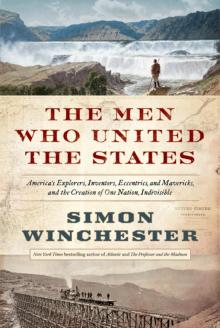 The Men Who United the States: America's Explorers
The Men Who United the States: America's Explorers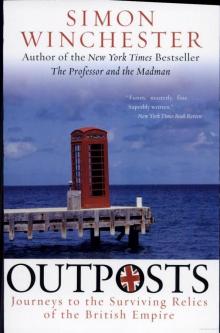 Outposts: Journeys to the Surviving Relics of the British Empire
Outposts: Journeys to the Surviving Relics of the British Empire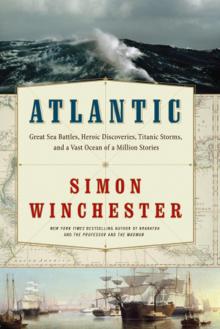 Atlantic: Great Sea Battles, Heroic Discoveries, Titanic Storms
Atlantic: Great Sea Battles, Heroic Discoveries, Titanic Storms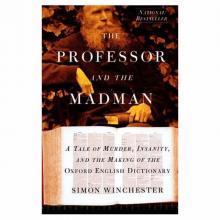 The Professor and the Madman: A Tale of Murder, Insanity
The Professor and the Madman: A Tale of Murder, Insanity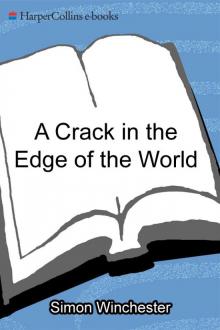 A Crack in the Edge of the World
A Crack in the Edge of the World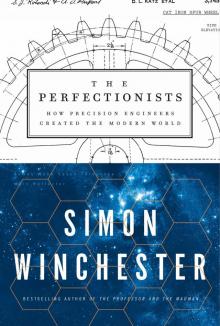 The Perfectionists: How Precision Engineers Created the Modern World
The Perfectionists: How Precision Engineers Created the Modern World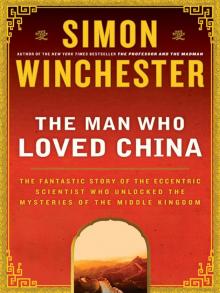 The Man Who Loved China: The Fantastic Story of the Eccentric Scientist
The Man Who Loved China: The Fantastic Story of the Eccentric Scientist The River at the Center of the World: A Journey Up the Yangtze
The River at the Center of the World: A Journey Up the Yangtze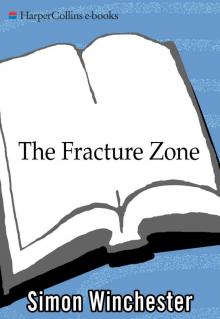 The Fracture Zone: My Return to the Balkans
The Fracture Zone: My Return to the Balkans The Map That Changed the World
The Map That Changed the World Krakatoa: The Day the World Exploded
Krakatoa: The Day the World Exploded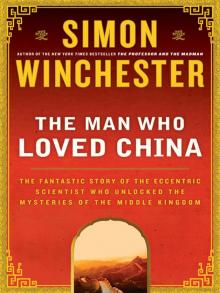 The Man Who Loved China
The Man Who Loved China The River at the Centre of the World
The River at the Centre of the World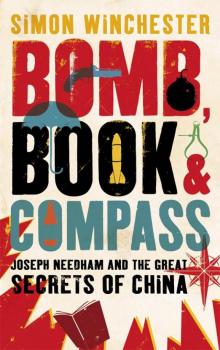 Bomb, Book and Compass
Bomb, Book and Compass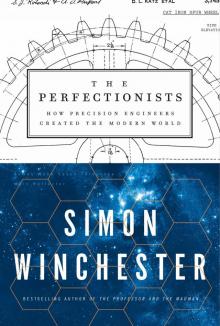 The Perfectionists
The Perfectionists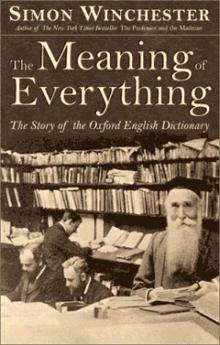 The Meaning of Everything
The Meaning of Everything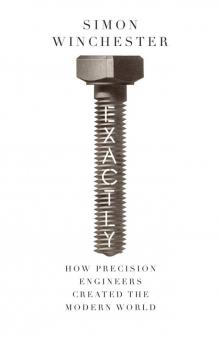 Exactly
Exactly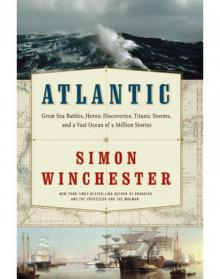 Atlantic
Atlantic Korea
Korea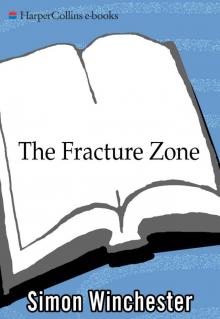 The Fracture Zone
The Fracture Zone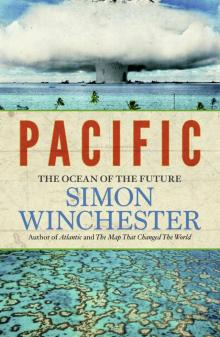 Pacific
Pacific Krakatoa
Krakatoa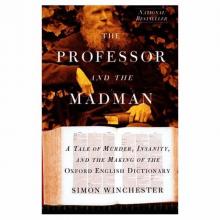 The Professor and the Madman
The Professor and the Madman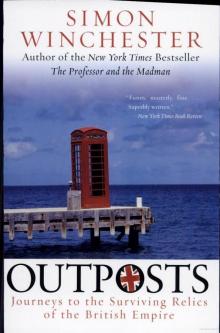 Outposts
Outposts